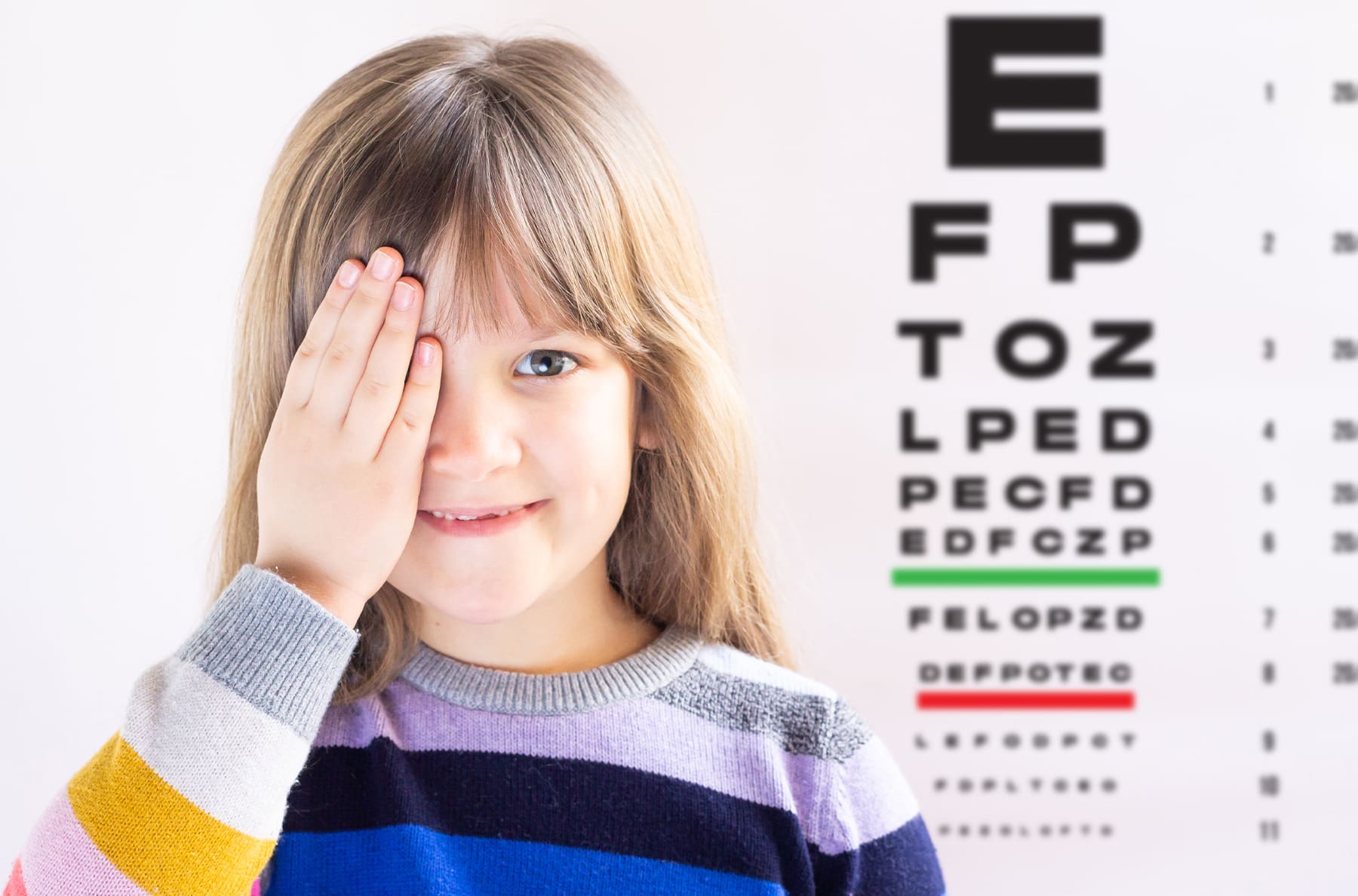Reviewed By Dr. Jodi Kuhn
Reading time: 4 minutes
If your child has started to squint, complain about blurry distance vision, or moves closer to screens, you may be seeing the early signs of nearsightedness. Myopia is becoming more common in children, and parents often ask if there is anything they can do to slow it down.
This blog explains why kids develop nearsightedness, what daily habits make it worse, and the steps you can take to protect your child’s vision and overall eye health.
Table of Contents
Key Takeaway
While children cannot outgrow nearsightedness, daily habits and specialized treatments can help slow its progression and protect long-term vision health.
Why More Children Are Developing Nearsightedness
Nearsightedness is a refractive error, that means the eye has grown too long from front to back, which causes distant objects to look blurry.
Many children develop myopia between ages 6 and 12, and it often worsens through the teenage years as axial length increases. Genetics plays a role, but lifestyle factors strongly influence how quickly myopia progresses.
Factors That Increase Nearsightedness
Certain habits and risk factors may accelerate changes in the eye’s shape that make distance vision blurrier.
- Extended close-up work: Spending long hours reading or using digital devices without breaks puts stress on the eyes and can make nearsightedness progress faster.
- Limited outdoor activity: Kids who spend little time outside miss out on natural daylight, which helps protect against myopia.
- High screen use: Phones, tablets, and computers keep eyes focused up close for long stretches, adding to the risk of progression.
- Genetics: Children with one or both parents who are nearsighted are more likely to develop higher levels of myopia and related complications over time.
How Parents Can Help Slow Progression
You can’t change genetics, but you can change daily habits that influence vision health.
- Encourage outdoor activity: Aim for at least 2 hours outside each day. Daylight exposure helps slow down abnormal eye growth.
- Set limits on screen time: Keep recreational screen time under 2 hours a day for school-aged children.
- Remind breaks during near work: A quick break every 20 minutes reduces strain from digital devices and books.
- Schedule regular eye exams: Annual checkups ensure changes in vision are caught early and myopia control treatments can be started promptly.
Options for Vision Correction
If your child is nearsighted, vision correction will help them see clearly in school, sports, and daily life.
Standard treatments:
- Glasses: Traditional lenses correct blurred distance vision so children can see clearly in class, while reading signs, or during outdoor activities.
- Contact lenses: Standard soft lenses are another option for older kids and teens who are ready for the responsibility of wearing them.
Specialized myopia control treatments:
In addition to providing clear vision, these treatments are designed to slow down the progression of myopia by addressing the way the eye grows.
- Myopia control glasses: Special spectacle lenses use unique optical designs (such as peripheral defocus) to help reduce signals that cause the eye to elongate.
- Dual-focus or multifocal contact lenses: These specialized lenses correct distance vision while also providing treatment zones that may slow myopia progression.
- Orthokeratology (Ortho-k): Custom rigid contact lenses are worn overnight to gently reshape the cornea, giving clear vision during the day without glasses or contacts, and may help slow eye growth.
- Atropine eye drops: Low-dose atropine, prescribed by an eye doctor, has been shown in clinical studies to reduce how quickly myopia worsens, especially in children with rapidly changing prescriptions.
Your eye doctor will recommend the best approach based on your child’s age, lifestyle, prescription, and how quickly their myopia is progressing.
Schedule an Eye Exam Today
If you are concerned about your child’s vision, schedule a comprehensive eye exam at Youth Vision. Our eye doctors accept Medicaid.
Schedule an exam today at the location most convenient for you:
- Denver Youth Vision, located at 1400 Grove Street, Denver, CO 80204, 303-825-2295
- Aurora Youth Vision, located at 14251 E. 6th Avenue, Aurora, CO 80011, 303-343-3133
- Thornton Youth Vision, located at 9674 Washington Street, Thornton, CO 80229, 303-953-880
- Hampden Youth Vision, located at 7400 East Hampden Ave. Unit C1, Denver, CO 80231, 720-866-9906
FAQs
Can my child outgrow nearsightedness?
Children do not typically outgrow nearsightedness. Once the eye has grown longer than normal, distance vision usually stays blurry and prescriptions often increase during the school years. While myopia cannot be reversed, healthy habits and specialized treatments can help slow its progression and lower the risks of more serious eye problems later in life.
Are glasses enough to stop myopia from getting worse?
Regular glasses help your child see clearly, but they do not slow the progression of nearsightedness. If your child’s prescription keeps changing, your eye doctor may suggest specialized options such as myopia control glasses, contact lenses, orthokeratology, or low-dose atropine eye drops to help slow down eye growth.
How often should my child’s eyes be checked?
Most children benefit from annual eye exams, but those with rapidly changing prescriptions may need checkups every 6 months. Regular visits help detect changes early, allowing your eye doctor to adjust treatment and recommend strategies to best protect your child’s vision.
Where can I take my child for an eye exam near me?
Youth Vision has several locations across the Denver area, making it convenient to schedule an appointment close to home. Whether you live in Denver, Aurora, Thornton, or near Hampden, you can find a clinic that provides comprehensive eye exams for children. All locations accept Medicaid and offer a wide range of myopia control treatments.


